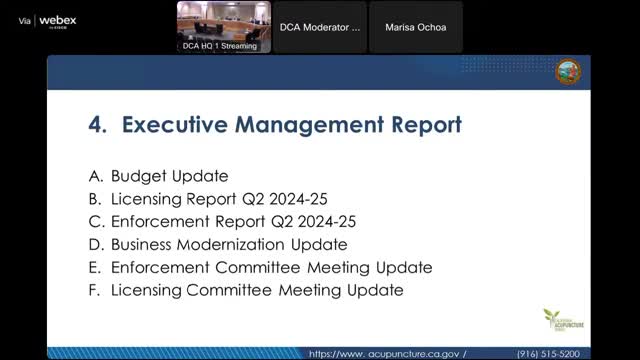Enforcement staff report steady caseload, work to reduce backlog; board hears calls to step up wall-license outreach and enforcement
Get AI-powered insights, summaries, and transcripts
Subscribe
Summary
Enforcement reported 19 complaints received in the quarter, 43 investigations closed and 313 pending cases; board members and public urged more outreach and complaint-driven enforcement for the wall-license posting requirement.
The California Acupuncture Board’s enforcement unit reported 19 complaints received for the quarter, 43 complaints closed and a caseload of 313 pending matters in its October–December report to the full board on March 7.
The enforcement report listed complaint categories including fraud (6 complaints), incompetence or negligence (6), unsafe or unsanitary conditions (1), unprofessional conduct (2), unlicensed practice (1) and criminal charges/conviction-related matters (1). Investigations closed in the quarter included 29 desk and 14 field investigations; the average days to close investigations in this quarter was 783 days, a figure enforcement staff said reflected case complexity and backlog.
Enforcement staffing and backlog: Staff told the board enforcement has seen high vacancies and turnover in prior years and only in the past 18–24 months has the unit been fully staffed and trained. Enforcement staff said they expect to make headway on older cases in coming quarters.
Wall-license enforcement: Board members and public commenters repeatedly raised the wall-license (location registration) requirement. Enforcement staff said the program is complaint-driven: when consumers report a practice that lacks the required posted wall license, enforcement will investigate; if the case merits, citation or other discipline can follow. The board discussed increased outreach (postcard, email reminders, updated brochures) to reduce noncompliance before it becomes a citation matter. "If a consumer is going in, they should be able to see a wall license," enforcement staff said; "we are complaint driven, but we can look to additional outreach."
Citations and AG cases: The enforcement unit reported two final citations issued in the quarter, with an average of 343 days to complete. Two cases were pending with the Attorney General; none were closed at the AG during the quarter. The unit reported two licensees on probation and one petition to revoke a probationary license.
Why it matters: A persistent backlog and multi-year investigations increase the time to final resolution of allegations, which affects both public protection and licensee fairness. The wall-license requirement — intended to make verification visible to consumers — relies heavily on public awareness and reporting, board members said.
Ending: Enforcement staff will continue to prioritize cases and increase outreach about wall-license requirements; the board’s enforcement committee will consider next steps to improve compliance and public education.
